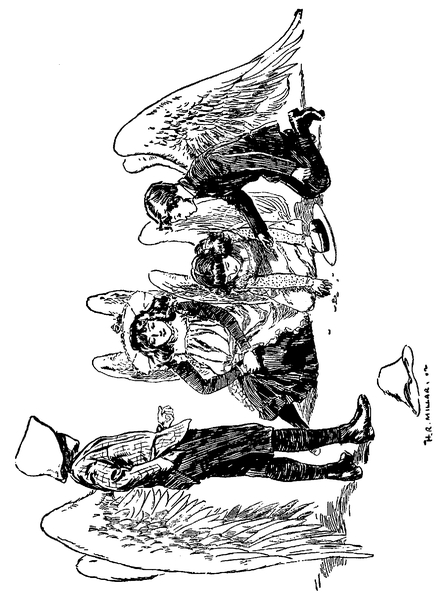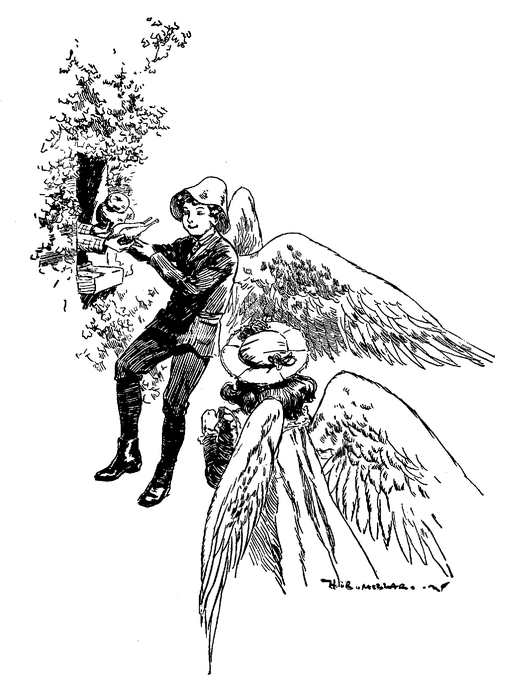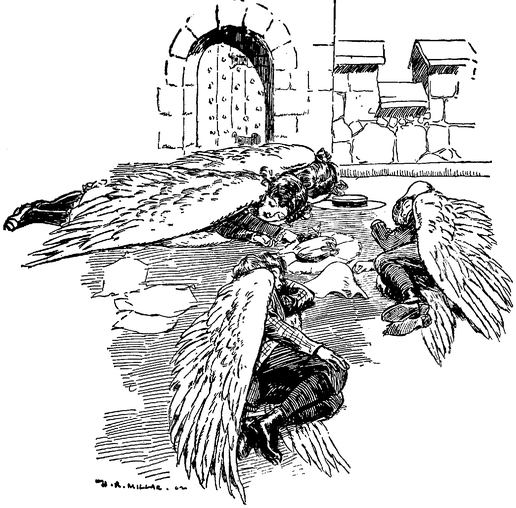Enchanted Castle and Five Children and It (Barnes & Noble Classics Series) (16 page)
Read Enchanted Castle and Five Children and It (Barnes & Noble Classics Series) Online
Authors: Edith Nesbit

BOOK: Enchanted Castle and Five Children and It (Barnes & Noble Classics Series)
6.63Mb size Format: txt, pdf, ePub
“Plenty?” repeated Robert hungrily; and the others looked vaguely round the bare leads of the church-tower, and murmured, “In the midst of?”
“Yes,” said Cyril impressively. “There is a larder
aq
window at the side of the clergyman’s house, and I saw things to eat inside—custard pudding and cold chicken and tongue—and pies—and jam. It’s rather a high window—but with wings—”
aq
window at the side of the clergyman’s house, and I saw things to eat inside—custard pudding and cold chicken and tongue—and pies—and jam. It’s rather a high window—but with wings—”
“How clever of you!” said Jane.
“Not at all,” said Cyril modestly; “any born general—Napoleon or the Duke of Marlborough
t
would have seen it just the same as I did.”
t
would have seen it just the same as I did.”
“It seems very wrong,” said Anthea.
“Nonsense,” said Cyril. “What was it Sir Philip Sidney said when the soldier wouldn’t stand him a drink?
3
‘My necessity is greater than his.’ ”
3
‘My necessity is greater than his.’ ”
“We’ll club our money, though, and leave it to pay for the things, won’t we?” Anthea was persuasive, and very nearly in tears, because it is most trying to feel enormously hungry and unspeakably sinful at one and the same time.
“Some of it,” was the cautious reply.
Everyone now turned out its pockets

Everyone now turned out its pockets on the lead roof of the tower, where visitors for the last hundred and fifty years had cut their own and their sweethearts’ initials with penknives in the soft lead. There was five-and-sevenpence-half-penny altogether, and even the upright Anthea admitted that that was too much to pay for four people’s dinners. Robert said he thought eighteen pence.
And half-a-crown was finally agreed to be “handsome.”
So Anthea wrote on the back of her last term’s report, which happened to be in her pocket, and from which she first tore her own name and that of the school, the following letter:
Dear Reverend Clergyman,
We are very hungry indeed because of having to fly all day, and we think it is not stealing when you are starving to
death. We
are afraid to ask you for fear you should say “No,” because of course you know about angels, but you would not think we were
angels. We
will only take the nessessities of life, and no pudding or pie, to show you it is not grediness but true starvation that makes us make your larder stand and deliver. But we are not highwaymen by trade.
death. We
are afraid to ask you for fear you should say “No,” because of course you know about angels, but you would not think we were
angels. We
will only take the nessessities of life, and no pudding or pie, to show you it is not grediness but true starvation that makes us make your larder stand and deliver. But we are not highwaymen by trade.
“Cut it short,” said the others with one accord. And Anthea hastily added:
Our intentions are quite honourable if you only knew. And here is
half-a-crown
to show we are sinseer and grateful.
half-a-crown
to show we are sinseer and grateful.
Thank you for your kind hospitality.
From Us Four.
The half-crown was wrapped in this letter, and all the children felt that when the clergyman had read it he would understand everything, as well as anyone could who had not seen the wings.
“Now,” said Cyril, “of course there’s some risk; we’d better fly straight down the other side of the tower and then flutter low across the churchyard and in through the shrubbery. There doesn’t seem to be anyone about. But you never know. The window looks out into the shrubbery. It is embowered in foliage, like a window in a story. I’ll go in and get the things. Robert and Anthea can take them as I hand them out through the window; and Jane can keep watch—her eyes are sharp—and whistle if she sees anyone about. Shut up, Robert! she can whistle quite well enough for that, anyway. It ought not to be a very good whistle—it’ll sound more natural and birdlike. Now then—off we go!”
These were the necessaries of life, which Cyril handed out of the larder window

I cannot pretend that stealing is right. I can only say that on this occasion it did not look like stealing to the hungry four, but appeared in the light of a fair and reasonable business transaction. They had never happened to learn that a tongue—hardly cut into—a chicken and a half, a loaf of bread, and a siphon of soda-water cannot be bought in shops for half-a-crown. These were the necessaries of life, which Cyril handed out of the larder window when, quite unobserved and without hindrance or adventure, he had led the others to that happy spot. He felt that to refrain from jam, apple turnovers, cake, and mixed candied peel was a really heroic act—and I agree with him. He was also proud of not taking the custard pudding—and there I think he was wrong—because if he had taken it there would have been a difficulty about returning the dish; no one, however starving, has a right to steal china pie-dishes with little pink flowers on them. The soda-water siphon was different. They could not do without something to drink, and as the maker’s name was on it they felt sure it would be returned to him wherever they might leave it. If they had time they would take it back themselves. The man appeared to live in Rochester, which would not be much out of their way home.
Everything was carried up to the top of the tower, and laid down on a sheet of kitchen paper which Cyril had found on the top shelf of the larder. As he unfolded it, Anthea said, “I don’t think that’s a necessity of life.”
“Yes, it is,” said he. “We must put the things down somewhere to cut them up; and I heard father say the other day people got diseases from germans in rain-water. Now there must be lots of rain-water here—and when it dries up the germans are left, and they’d get into the things, and we should all die of scarlet fever.”
“What are germans?”
“Little waggly things you see with microscopes,” said Cyril, with a scientific air. “They give you every illness you can think of. I’m sure the paper was a necessary, just as much as the bread and meat and water. Now then! Oh, my eyes, I am hungry!”
I do not wish to describe the picnic party on the top of the tower. You can imagine well enough what it is like to carve a chicken and a tongue with a knife that has only one blade—and that snapped off short about half-way down. But it was done. Eating with your fingers is greasy and difficult—and paper dishes soon get to look very spotty and horrid. But one thing you can’t imagine, and that is how soda-water behaves when you try to drink it straight out of a siphon—especially a quite full one. But if imagination will not help you, experience will, and you can easily try it for yourself if you can get a grown-up to give you the siphon. If you want to have a really thorough experience, put the tube in your mouth and press the handle very suddenly and very hard. You had better do it when you are alone—and out of doors is best for this experiment.
However you eat them, tongue and chicken and new bread are very good things, and no one minds being sprinkled a little with soda-water on a really fine hot day. So that everyone enjoyed the dinner very much indeed, and everyone ate as much as it possibly could: first, because it was extremely hungry; and secondly, because, as I said, tongue and chicken and new bread are very nice.
Now, I daresay you will have noticed that if you have to wait for your dinner till long after the proper time, and then eat a great deal more dinner than usual, and sit in the hot sun on the top of a church-tower—or even anywhere else—you become soon and strangely sleepy. Now Anthea and Jane and Cyril and Robert were very like you in many ways, and when they had eaten all they could, and drunk all there was, they became sleepy, strangely and soon—especially Anthea, because she had got up so early.
One by one they left off talking and leaned back, and before it was a quarter of an hour after dinner they had all curled round and tucked themselves up under their large soft warm wings and were fast asleep. And the sun was sinking slowly in the west. (I must say it was in the west, because it is usual in books to say so, for fear careless people should think it was setting in the east. In point of fact, it was not exactly in the west either—but that’s near enough.) The sun, I repeat, was sinking slowly in the west, and the children slept warmly and happily on—for wings are cosier than eiderdown quilts to sleep under. The shadow of the church-tower fell across the churchyard, and across the Vicarage, and across the field beyond; and presently there were no more shadows, and the sun had set, and the wings were gone. And still the children slept. But not for long. Twilight is very beautiful, but it is chilly; and you know, however sleepy you are, you wake up soon enough if your brother or sister happens to be up first and pulls your blankets off you. The four wingless children shivered and woke. And there they were—on the top of a church-tower in the dusky twilight, with blue stars coming out by ones and twos and tens and twenties over their heads—miles away from home, with three-and-three-half-pence in their pockets, and a doubtful act about the necessities of life to be accounted for if anyone found them with the soda-water siphon.
The children slept

They looked at each other. Cyril spoke first, picking up the siphon:
“We’d better get along down and get rid of this beastly thing. It’s dark enough to leave it on the clergyman’s doorstep, I should think. Come on.”
There was a little turret at the corner of the tower, and the little turret had a door in it. They had noticed this when they were eating, but had not explored it, as you would have done in their place. Because, of course, when you have wings, and can explore the whole sky, doors seem hardly worth exploring.
Now they turned towards it.
“Of course,” said Cyril, “this is the way down.”
It was. But the door was locked on the inside!
And the world was growing darker and darker. And they were miles from home. And there was the soda-water siphon.
I shall not tell you whether anyone cried, nor, if so, how many cried, nor who cried.You will be better employed in making up your minds what you would have done if you had been in their place.
CHAPTER V
No WINGS
W
hether anyone cried or not, there was certainly an interval during which none of the party was quite itself. When they grew calmer, Anthea put her handkerchief in her pocket and her arm round Jane, and said:
hether anyone cried or not, there was certainly an interval during which none of the party was quite itself. When they grew calmer, Anthea put her handkerchief in her pocket and her arm round Jane, and said:
“It can’t be for more than one night. We can signal with our handkerchiefs in the morning. They’ll be dry then. And someone will come up and let us out—”
“And find the siphon,” said Cyril gloomily; “and we shall be sent to prison for stealing—”
“You said it wasn’t stealing. You said you were sure it wasn’t.”
“I’m not sure now,” said Cyril shortly.
“Let’s throw the beastly thing slap away among the trees,” said Robert, “then no one can do anything to us.”
“Oh yes”—Cyril’s laugh was not a lighthearted one—“and hit some chap on the head, and be murderers as well as—as the other thing.”
“But we can’t stay up here all night,” said Jane; “and I want my tea.”
“You can’t want your tea,” said Robert; “you’ve only just had your dinner.”
“But I do want it,” she said; “especially when you begin talking about stopping up here all night. Oh, Panther—I want to go home! I want to go home!”
“Hush, hush,” Anthea said. “Don‘t, dear. It’ll be all right, somehow. Don’t, don’t—”
Other books
Pursuit of the Zodiacs by Walsh, Nathan
Daylight Runner by Oisin McGann
In Firm Pursuit by Pamela Samuels-Young
Tropical Depression by Jeff Lindsay
Negative by Viola Grace
Feel the Heat: A Contemporary Romance Anthology by Evelyn Adams, Christine Bell, Rhian Cahill, Mari Carr, Margo Bond Collins, Jennifer Dawson, Cathryn Fox, Allison Gatta, Molly McLain, Cari Quinn, Taryn Elliot, Katherine Reid, Gina Robinson, Willow Summers, Zoe York
The Bird Market of Paris by Nikki Moustaki
One Night for Love by Maggie Marr
Wicked Waves: Solsti Prophecy #2 by Kay, Sharon
Gladiator: Vengeance by Simon Scarrow
